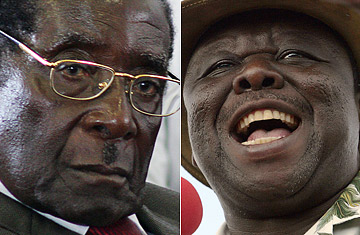
Zimbabwean President Robert Mugabe (left) and opposition candidate Morgan Tsvangirai.
Zimbabwe's opposition leader Morgan Tsvangirai was detained Wednesday at a military roadblock, a day after President Robert Mugabe suspended the work of foreign aid groups on which hundreds of thousands of Zimbabweans depend for food. In what appeared to be an acceleration of repression ahead of a presidential run-off election on June 27, Mugabe's challenger was "unlawfully detained" at a checkpoint north of Bulawayo, a spokesman for the opposition Movement for Democratic Change (MDC) told TIME. Tsvangirai was held for eight hours before being released. No charges were filed against him.
Tsvangirai's brief detention follows the announcement by the humanitarian agency CARE International, which has 300 workers in Zimbabwe, that it has been ordered by the government to suspend operations. Mugabe, speaking a U.N. conference in Rome on the world food crisis on Tuesday, had accused aid organizations of funneling money and other support to the MDC. The government later announced the suspension of almost all foreign humanitarian groups in Zimbabwe, alleging they too were interfering in Zimbabwe's internal politics.
Mugabe — whose endorsement in 2000 of the seizure of white-owned commercial farms by gangs of militiamen led to agricultural output plummeting in a country once hailed as the breadbasket of Southern Africa — blamed his country's crisis on "illegal" Western sanctions designed to "cripple Zimbabwe's economy and thereby effect illegal regime change in our country." But foreign ministers from Britain and Australia branded as "obscene" the fact that Mugabe was attending a food summit while so many Zimbabweans were on the bread line as a result of his policies.
Tiseke Kasambala, a Zimbabwe expert at Human Rights Watch, added that the government's suspension of independent aid operations was merely a tactic to influence the upcoming vote by leaving it up to the government to allocate food. The suspension of aid could have immediate effect on the millions of Zimbabweans who rely either entirely or partly on it for their daily bread. Unemployment stands at 80%, the inflation rate is more than 100,000%, and average life expectancy is in the mid-30s. "The decision to let people go hungry is yet another attempt to use food as a political tool to intimidate voters ahead of an election," said Kasambala. "President Mugabe's government has a long history of using food to control the election outcome."
The latest moves appear to confirm that Mugabe and his Zanu-PF party are prepared to take ever more desperate measures to retain power. Zanu-PF lost control of parliament in the general election on March 29, and official results also showed Mugabe having been eclipsed by Tsvangirai in the presidential poll. (Tsvangirai claimed to have received more than 50% of votes cast, which would have given him an outright victory, but the Zimbabwe Electoral Commission, staffed by Mugabe loyalists, claimed that while the opposition leader's tally was greater than the President's, it had not passed 50%, which meant a run-off vote was required.)
Repression against opposition activists and supporters has escalated sharply since the March 29 poll. Pro-Mugabe militias and security forces have moved into opposition strongholds, attacking party workers, civil society groups and independent journalists. The MDC claims that more than 50 of its supporters have been killed since election day. Tsvangirai only returned to Zimbabwe last week, having left for South Africa after the first round of voting, partly out of concerns for his safety. (Tsvangirai's skull was split in a police beating in March 2007).
Of particular concern is the increasingly assertive support for Mugabe by the commanders of Zimbabwe's security services. At the weekend, army chief of staff Major General Martin Chedondo advised soldiers that their loyalty was above all to the regime. "If you have other thoughts, then you should remove that uniform," he said at a marksmanship contest outside Harare, according to the state-run Herald newspaper. "Soldiers are not apolitical; only mercenaries are apolitical. We should therefore stand behind our commander-in-chief." In interview with TIME in April, Tsvangirai accused the regime of staging a "de facto military coup." Those accusations were echoed in a report last week by the International Crisis Group, which said military commanders were instrumental in preventing the opposition from claiming the victory it won on March 29. The ICG warned of a "growing risk of a coup" either before June 27, as a pre-emptive move to deny Tsvangirai victory, or after a Tsvangirai win. The MDC spokesman told TIME that Tsvangirai's brief detention should be seen as part of the same strategy of harassment. "The idea is to intimidate us and the whole population," said the spokesman. "What we are witnessing is a regime in a state of panic, lashing out in any direction."
